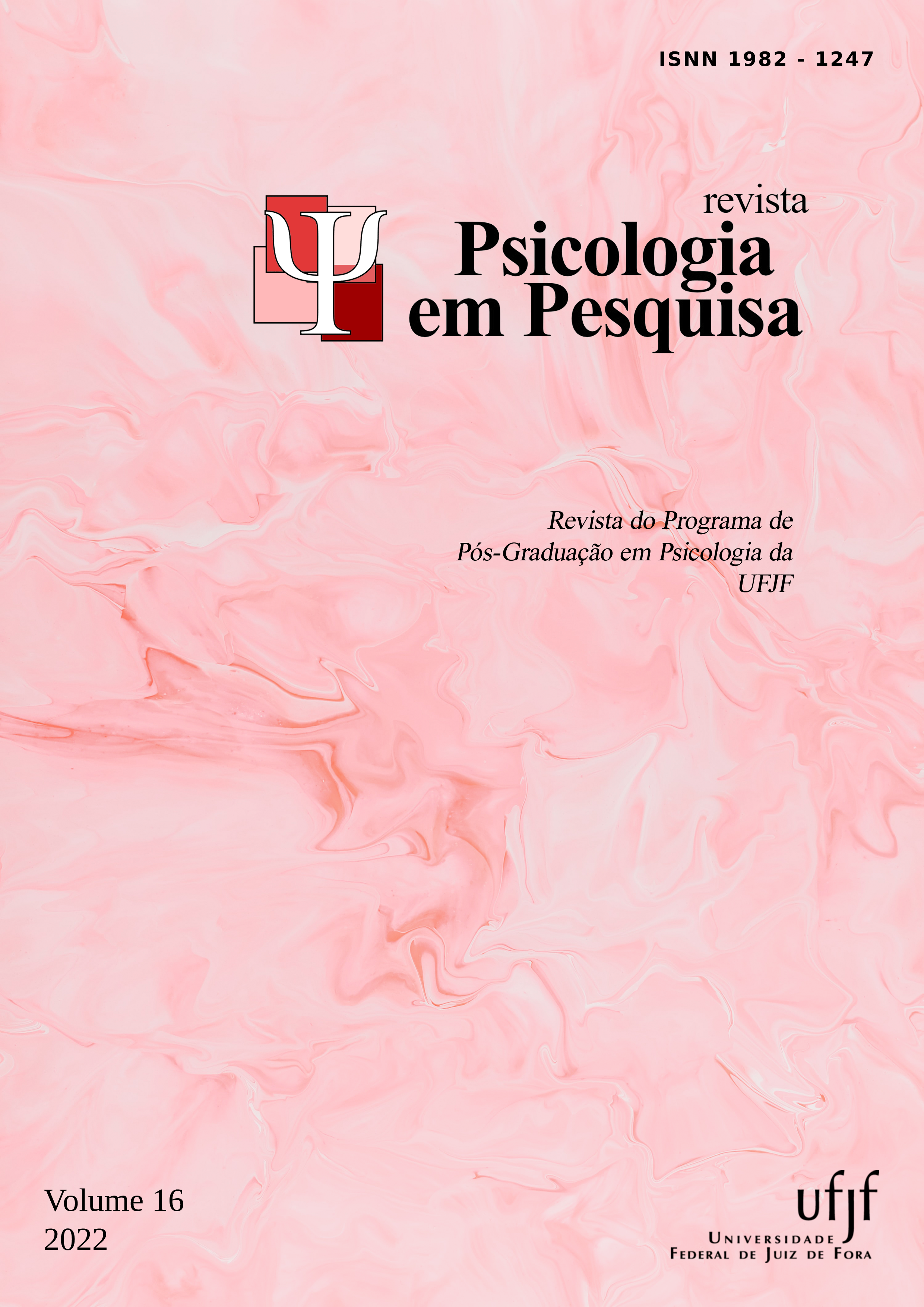Outgrowing the brain: Andy Clark and the embodied cognition
DOI:
https://doi.org/10.34019/1982-1247.2022.v16.31536Keywords:
Embodied cognition, Andy Clark, Philosophy of mind, Body-mind, Developmental psychologyAbstract
We discuss Andy Clark’s concept of embodied cognition and its relation to the body-mind problem. The objective is to define the concept, its related topics, and how it lay down new theoretical alternatives to that question. We expose its main theoretical influences, following this perspective’s understanding about the relationship between brain, cognition, and body. Comparing this concept with other cognitive theories, we finish the exposition by discussing the possibility of embedding this theoretical framework into cognitive sciences, psychology and psychoanalysis, while also analyzing its boundaries and potentialities for a new perspective on cognitive development.
Downloads
References
Ades, C. (1993). Por uma história natural da memória. Psicologia USP, 4(1/2), 25-47. doi:10.1590/S1678-51771993000100003
Ballard, D. H., Hayhoe, M. M., Pook, P. K., & Rao, R. P. (1997). Deictic codes for the embodiment of cognition. Behavioral and Brain Sciences, 20(4), 723–767. doi:10.1017/S0140525X97001611
Ballesteros, A., & Resende, B. D. (2015). Mente e cognição: Um convite ao ceticismo e admiração. In B. D. Resende, M. C. Lima-Hernandes, F. V. de Paula, M. Módolo, S. Caetano (Orgs), Linguagem e cognição: Um diálogo interdisciplinar (pp. 41-64). Lecce e Rovato, Itália: Pensa MultiMedia Editore.
Barrett, L. F. (2011). Constructing emotion. Psychological Topics, 20(3), 359-380. Recuperado de https://hrcak.srce.hr/index.php?show=clanak&id_clanak_jezik=116997
Brooks, R. A. (1991). Intelligence without Representation. Artificial Intelligence 47(1), 139–159. doi: 10.1016/0004-3702(91)90053-M Bunge, M. (1980). The mind-body problem: A psychobiological approach. Oxford: Pergamon Press.
Clark, A. (1995). I am John’s Brain. Journal of Consciousness Studies, 2(2), 144-8. doi:10.1017/S1477175608000134
Clark, A. (1997). Being there: Putting brain, body, and world together again. Bradford Book. Cambridge, Massachusetts, London: The MIT Press.
Clark, A. (1998). Where brain, body and world collide. Daedalus: Journal of the American Academy of Arts and Sciences, 172(2), 257-280.
Clark, A. (1999). Embodiment: From fish to fantasy. Trends in Cognitive Sciences, 3(9), 345-351. Recuperado de https://era.ed.ac.uk/handle/1842/1296
Clark, A. (2003). Artificial intelligence and the many faces of reason. In S. P. Stich, & T. A. Warfield. The blackwell guide to philosophy of mind. Recuperado de http://www.philosophy.ed.ac.uk/people/ clark/pubs/AIandFacesofReason.pdf
Clark, A. (2016). Busting out: Predictive brains, embodied minds, and the puzzle of the evidentiary veil. Noûs. 50(1), 20-37. doi:10.1111/nous.12140
Clark, A. & Grush, R. (1999). Towards a cognitive robotics. Adaptative Behavior, 7(1), 5-16. Recuperado de http://www.philosophy.ed.ac.uk/people/clark/pubs/tacrfinalw-Grush.pdf
Eigsti, I. M. (2013). A review of embodiment in autism spectrum disorders. Frontiers in Psychology, 2(224), 1-10. doi:10.3389/fpsyg.2013.00224
Flynn, E. G., Kendal, J. R., Kendal, R. L., & Laland, K. N. (2013). Developmental niche construction. Developmental Science, 16(2), 296-313. doi:10.1111/desc.12030
Fodor, J. A. (1981). The mind–body problem. Scientific American, 244(1), 114–123. doi:10.1038/scientificamerican0181-114
Gallese, V. (2005). Embodied simulation: From neurons to phenomenal experience. Phenomenology and the Cognitive Sciences, 4(1), 23-48. doi:10.1007/s11097-005-4737-z
Gibson, J. J. (1979). The ecological approach to visual perception. Boston: Houghton Mifflin Company.
Gibson, E. J., & Pick, A. D. (2000). An ecological approach to perceptual learning and development. New York: Oxford University Press.
Gjelsvik B., Lovric D., & Williams, J. M. G. (2014). Embodied cognition and emotional disorders: Embodiment and abstraction in understanding depression. Psychopathology Review, 2(1), 1-50. doi:10.5127/pr.035714
Hutchins, E., & Kirsh, D. (2000). Distributed cognition: Toward a new foundation for human-computer interaction research. ACM Transactions on Computer-Human Interaction, 7(2), 174-196. doi:10.1145/353485.353487
Klein, M. (1991). Notas sobre alguns mecanismos esquizoides. In M. Klein, Inveja e gratidão e outros trabalhos (pp. 17-43). Rio de Janeiro: Imago (Trabalho original publicado em 1946).
Lockman, J. J. (2000). A perception-action perspective on tool use development. Child Development, 71(1), 137-144. doi:10.1111/1467-8624.00127
Mandelbaum, B. (2010). Trabalhos com famílias em psicologia social. (Tese de Livre Docência não publicada) Universidade de São Paulo, Programa de Pós-Graduação em Psicologia Social. Recuperado de https://teses.usp.br/teses/disponiveis/livredocencia/47/tde-18022013-083442/publico//mandelbaum_ld.pdf
Merleau-Ponty, M. (2013). Chapitre premier. Le comportement réflexe. In M. Merleau-Ponty, La structure du comportement (pp. 5-73). Paris: Presses Universitaires de France.
Oyama, S., Griffiths, P. E, & Gray, R. D. (2003). Cycles of contingency: Developmental systems and evolution. Estados Unidos: MIT Press.
Resende, B. (2019a). Infants’ characteristics and skills: Dissolving the nature/nurture dichotomy. Trends in Psychology, 27(1), 99-111. doi:10.9788/tp2018.4-08
Resende, B. (2019b). Etologia, cognição e sistemas em desenvolvimento. (Tese de livre-docência) Universidade de São Paulo, Programa de Pós-Graudação em Psicologia Experimental. Recuperado de https://edisciplinas.usp.br/pluginfile.php/5371044/mod_resource/content/1/tese%20livre-doce%CC%82ncia%20Resende%20dez2019.pdf
Ryle, G. (2005). El concepto de lo mental. Barcelona: Paidós.
Smith, L. B., & Thelen, E. (2003). Development as a dynamic system. Trends in Cognitive Sciences, 7(8), 343-348. doi:10.1016/S1364-6613(03)00156-6
Thelen, E. (2002). Self-organization in developmental processes: Can systems approaches work? In R. O. Gilmore, M. H. Johnson, & Y. Munakata. brain development and cognition: A reader (pp. 336-374). Oxford: Blackwell Publishers.
Waal, F. B.de, & Ferrari, P. F. (2010). Towards a bottom-up perspective on animal and human cognition. Trends in Cogitive Science, 14(5), 201-207. doi:10.1016/j.tics.2010.03.003















